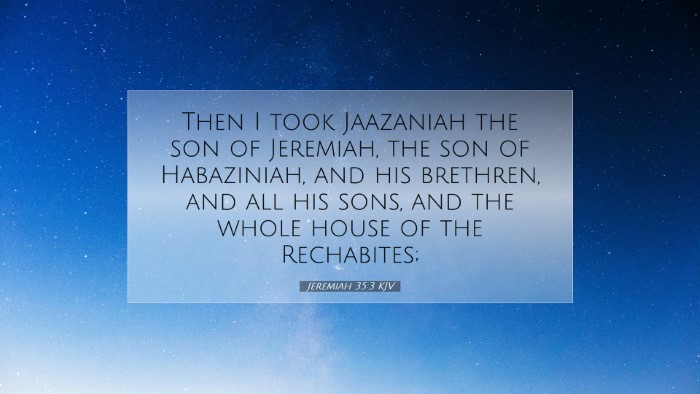Commentary on Jeremiah 35:3
Verse: "Then I took Jaazaniah the son of Jeremiah, the son of Habazziniah, and his brethren, and all his sons, and the whole house of the Rechabites;" (Jeremiah 35:3)
Introduction
This passage introduces the Rechabites, a group noted for their strict adherence to their forefathers' commands. The actions of the prophet Jeremiah and the significance of the Rechabites provide rich insights into themes of faithfulness, obedience, and the contrast between God's commands and human traditions.
Background of the Rechabites
The Rechabites were descendants of Jonadab, the son of Rechab, who had laid down stringent laws for his descendants, particularly prohibiting the drinking of wine and the settling down in permanent homes. This vow reflects a commitment to remain separate from the corrupt practices of the surrounding nations.
- Their background exhibits a commendable resolve in adhering to a lifestyle that honors their ancestor's directives.
- This dedication serves as a direct contrast to the infidelity and disobedience commonly exhibited by the people of Judah during Jeremiah's time.
Jeremiah's Actions
Jeremiah's gathering of the Rechabites is significant. He does not merely refer to them but actively engages them in a symbolic act, presenting them as an example to the nation of Judah.
- According to Matthew Henry, this action reveals Jeremiah's effort to showcase an example of zealous obedience to God’s word amidst the backdrop of Judah’s apostasy.
- Albert Barnes notes that this account illustrates the moral superiority of the Rechabites, who obey the instructions of men over the disobedience of Judah, who ignores divine commands.
Theological Implications
This narrative raises several theological implications for the readers:
- Faithfulness to God’s Standards: The Rechabites serve as a model of faithfulness. Their decision to maintain their vows underscores the importance of adhering to God’s word and the traditions He has set for His people.
- Separation from Worldly Influence: Their refusal to partake in reflective pleasures indicates a need for separation from societal trends that lead to spiritual decline.
- God’s Command vs. Human Tradition: The contrast drawn between God’s commandments and human traditions raises questions about the nature and authority of traditions within faith communities.
Reflection on Spiritual Integrity
In modern ministry, the Rechabites provide a challenge to the church’s integrity:
- Are adherents maintaining their commitments in a culture that often shifts its values?
- How does one balance the adherence to divine principles with the pressures to conform to societal norms?
Pastors and theologians are encouraged to examine these questions seriously, as they probe into the depths of spiritual integrity in the lives of believers.
Contrast with Judah
The stark contrast between the Rechabites and the people of Judah highlights the broader spiritual dynamics in play:
- Judah is depicted as a people who have turned away from God's instructions, indulging in their desires and neglecting the solemnity of their covenant relationship with Him.
- In contrast, the Rechabites exemplify an unwavering commitment to their ancestral guidelines, which they perceive as an honor to God.
Adam Clarke emphasizes that this contrast serves as both a rebuke and a challenge for the people of Judah. The faithfulness of the Rechabites stands as a testament to what it means to truly honor God's expectations.
Application for Contemporary Believers
This passage calls for self-examination among believers relating to heritage and tradition:
- Preservation of Faith: How are modern believers keeping the faith handed down through generations?
- Cultural Engagement: In what ways can believers engage with culture without compromising their commitments to God?
As ministers and scholars study the text, they are confronted with the advancement of cultural norms that may threaten their adherence to biblical teaching.
Conclusion
Jeremiah 35:3 serves as a poignant reminder of the importance of fidelity to God amid external pressures and influences. The example of the Rechabites challenges modern believers to stand firm in their convictions and to strive for spiritual integrity in a world rife with distractions.
The richness of the Rechabites' example and the careful actions of Jeremiah provide a multifaceted approach to understanding the significance of obedience to God's commands as opposed to mere adherence to human traditions. This often overlooked passage invites deeper reflection and intentional application for all who seek to walk faithfully in their covenant relationship with God.


